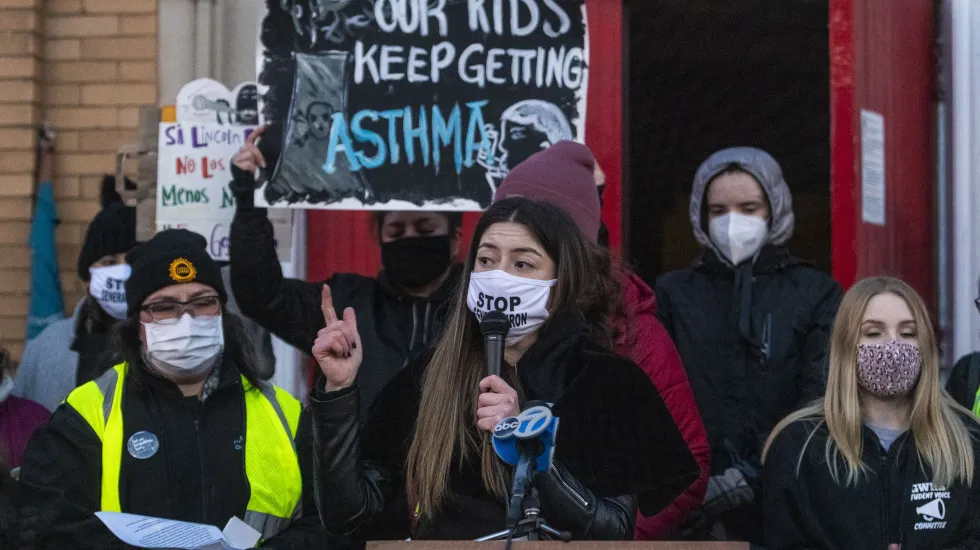Ald. Susan Sadlowski Garza walked a tightrope over the past four years, avoiding publicly praising or condemning a proposed scrap-metal operation in her Southeast Side ward, despite furious opposition from some residents.
Until recently, that is, when she launched into an almost 20-minute defense of the project on a podcast interview, lashing out at community groups, environmentalists, the media, City Hall, Chicago’s public health commissioner and, most notably, her political ally Mayor Lori Lightfoot for preventing the business from opening in her ward.
Analysis
A decision last month to deny an operating permit to the car- and metal-shredding operation, formerly known as General Iron, was based purely on politics, not science, Garza said. That claim on the Ben Joravsky Show on Feb. 26 came just four days after Garza blasted out an email to her constituents saying the decision was “guided by a rigorous review of the science and the voice of the community.”
In her discussion with Joravsky about the permit denial, which followed a nine-month impact study of environmental health concerns in the 10th Ward, Garza largely ignored the hundreds of pages of analysis generated during the process and said Chicago Public Health Commissioner Allison Arwady made “a political decision.”
“I am not stupid and I hope you can sleep at night knowing that you are putting all these people out of work,” Garza said, referring to a conversation she had with Arwady.
Garza’s conflicting statements on why the permit was denied led many health experts — who argued against the shredder — to push back on Garza’s claim that it was not based on the health risks to the community.
“The voice of the community was strong here but, in the end, this was a scientific decision,” said Dr. Steven Rothschild, chair of the Department of Family Medicine at Rush University Medical Center. “The project would pose a significant risk of increasing airborne particulates, noise and diesel emissions in an area that already faces the highest burden of those health risks in the region.”
Garza faced early community pressure to oppose the plan, announced in July 2018, for General Iron to move from Lincoln Park to East 116th Street along the Calumet River. But just as was the case recently, her public statements sometimes contradicted what she said behind the scenes.
A month before the announcement that Reserve Management Group would merge with General Iron and move it to the Southeast Side, Garza sent an email to City Hall. In it, she used a phrase common among activists who wanted development with an environmental focus: “I’d like to make General Iron the poster child for the Green Economic Corridor,” Garza wrote.
Despite that email, she tried to rewrite the record just two years later in a July 2020 statement about “setting the record straight,” posted on her website.
“I have never supported the relocation of General iron to the 10th Ward,” it said.
That statement remains online despite her recent comments strongly supporting the facility.

In those recent comments, Garza didn’t mention the primary arguments in Arwady’s more than 220-page denial letter to RMG, including the overall impact of years of air pollution in the area or an accompanying report by the Centers for Disease Control and Prevention. That report noted the expected increase in fine soot “could be harmful” in a community with more highly sensitive people than in other areas in the city who “are susceptible to respiratory symptoms and exacerbation of lung and heart disease.”
Instead, Garza paraphrased a comment by a city consultant she referred to as an “EPA study man.” She said he claimed “less than one in a million people have the chance of getting sick from this facility.” The statement was a reference to the consultant’s modeling that found cancer risk would not be heightened by allowing the operation.
Her brief summary also made no mention of numerous other environmental threats outlined in the 500-page report, including high levels of lead on the property or other inherent dangers at shredding operations, including fires and explosions, cited by Arwady.
“She’s not worried about people’s health,” Lilly Martin, 58, a lifelong resident of the Southeast Side, said of Garza, adding that though the council member is right that the area faces economic challenges, “we need stores here — not factories that aren’t doing anything for us.”
Hearing Garza’s comments on the podcast now made residents wonder if she was ever concerned about what they had to say. Garza said in the interview that only environmental justice activists in her ward opposed the General Iron plan, even though the high-profile campaign included demonstrations, marches and a month-long hunger strike last year.
“When we protested outside of her house back in 2020, she put on a show as if she cared about what residents were frustrated about,” said hunger striker Yesinia Chavez, 27, a lifelong Southeast Sider. Garza was “making it seem as if she was actually listening to us when she never actually did.”
Garza declined repeated interview requests from the Sun-Times.
“Sue’s comments speak for themselves,” her policy director John Heroff said in a text message.
Brett Chase’s reporting on the environment and public health is made possible by a grant from The Chicago Community Trust.







